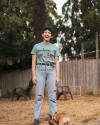“You write in order to change the world.”
- James A. Baldwin, 1979 NY Times Interview
“When you're writing you're trying to find out something which you don't know.”
- James A. Baldwin, from 1984 Paris Review Interview
The first James Baldwin quote on this syllabus is a popular one. I bet you can guess why. It’s catchy. Perhaps it’s invoked to inspire writers, to charge their work with the potential of transforming communities and society at large. When you read it, what feelings does it bring up in your body or mind? Whatever field of study you are pursuing, whether you love to write or fear you may have an allergy to the act, or somewhere in-between these extremes -- what does this quote bring up for you? Maybe it strikes a chord or maybe it bores you to tears or maybe it confuses you.
Any response is valid. How you read this quote has everything to do with who you are. And that is one key question we will engage as readers and writers in English 131 this quarter:
- *How do we recognize different audiences and contexts, then compose for a specific writing situation?* (Outcome 1)
If we examine this quote further, finding out where it came from (an interview in the New York Times) and when Baldwin said it (1979), we will also discover that it is often quoted with most of the sentence missing. In full, the quote reads, “You write in order to change the world, knowing perfectly well that you probably can't, but also knowing that literature is indispensable to the world... The world changes according to the way people see it, and if you alter, even by a millimeter, the way... people look at reality, then you can change it.”
How does Baldwin's full thought change the feeling this quote gives you? Whoever made the decision to snip off everything after the first part had an agenda and was engaging with this quote in a particular way to incite a particular response. This is another muscle we will build in this course, asking ourselves and each other:
- *How do we engage with complex information in order to incorporate it into our writing?* (Outcome 2).
Whoever originally clipped down this quote, and perhaps anyone who shares it in that shortened form (myself included), seems to be doing so for a reason, to engage in a conversation, to argue for something. Did I put that quote as the first thing on this document to make you feel like writing matters? Did I choose it because I wanted to empower and inspire you? Did I do it just so I could have a cute way of sharing the course outcomes with you? Whatever you think my reason was, do you think I’ve crafted a compelling argument for how this quote demonstrates what we are going to learn together?
No need to answer those. I’m just using questions for rhetorical effect. If you’re completely bewildered by all my weird jargon, you’re in the right place. Because this quarter, we are going to ask the question:
- *What is an inquiry-driven argument? How do we craft arguments that matter?* (Outcome 3).
If you’re thinking: does any of this matter? Why is it a university requirement for me to read this weirdo’s inner dialogue? Those are great questions! I don’t know any of you yet, but I have a feeling that you want to change the world. Whatever you are here to study, whatever your dream career is -- I want to support you in changing your world and you will need writing skills to do that.
Okay, but real talk: is this syllabus working for you? Is it confusing? Is it too long? Are you even still reading? To be quite frank, I’m new to teaching this course and I’m going to be learning alongside you. I’m really interested in your feedback on this piece of writing and on the course in general, so please don’t hesitate to reach out to me.
Indeed, this course will be marked by a focus on community building and offering our perspectives to each other, as a way of deepening our reading and writing. Through discussion and giving constructive feedback, we will grapple with the question of:
- *How do we revise and (re)vision writing—our own and others'? What makes a piece of writing "finished"?* (Outcome 4)
I hope by next quarter this syllabus is better because you all helped me to (re)vision it. To be honest, when I started writing it, I didn’t know exactly what I was going to say, or if this whole quote thing was going to pan out.
But that’s another thing about the journey we will take together as writers: *it is truly all about the process.* You will be encouraged to experiment, have fun, make mistakes and discover things about yourself as a writer. As James Baldwin said, “When you're writing you're trying to find out something which you don't know.”
You'll have 4 Short Assignments (SAs) and 2 Major Projects (MPs), some of which will be revised for your final portfolio. In-class work will be interactive. Be prepared to read and/or write for every class meeting and in-between synchronous class-time.
